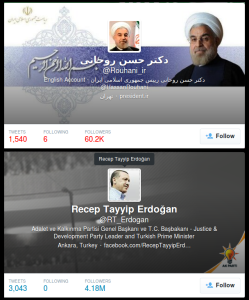 The least one can say about the Turkish prime minister’s decision two weeks ago to ban Twitter in his country, it was a hilariously hypocritical decision. For Mr Erdogan has a Twitter account himself and tweets frantically all day long. But many people may not know that we, Iranians, are very familiar with this story. Because while Twitter has been blocked in Iran forever, our president and other state officials nonetheless have official Twitter accounts and frequently tweet about their stately affairs. In fact president Rouhani has more than one account: @Rouhani_ir, @HassanRouhani, @drRouhani, etc.
The least one can say about the Turkish prime minister’s decision two weeks ago to ban Twitter in his country, it was a hilariously hypocritical decision. For Mr Erdogan has a Twitter account himself and tweets frantically all day long. But many people may not know that we, Iranians, are very familiar with this story. Because while Twitter has been blocked in Iran forever, our president and other state officials nonetheless have official Twitter accounts and frequently tweet about their stately affairs. In fact president Rouhani has more than one account: @Rouhani_ir, @HassanRouhani, @drRouhani, etc.
One must say, though, our president is no where as good a Tweeter as the Turkish prime minister, with only a few hundred thousand followers between all his accounts, compared to Erdogan’s 4.18 million followers. Of course Rouhani does not tweet himself, certainly not in English, nor do most state officials in the world. During a meeting with a small group of journalists at the World Economic Forum in Davos earlier this year, Rouhani confessed, in response to a direct question from a journalist, that he did not write the “pithy messages” on the social-media accounts associated with him; they are written by “friends”, he said. (see http://time.com/1775/no-irans-rouhani-doesnt-tweet/). Friends is Iranian code for communications team.
EDITOR’S COMMENT:
The Twitter ban in Turkey was lifted on Thursday (3 April 2014) after the constitutional court ruled that the block breached freedom of expression, a decision highly unlikely to be taken by any court in Iran in the foreseeable future. Despite peoples’ voting for the new government in the hope of achieving more social freedoms (including free access to social community networks) their only achievement in this regard was a few accounts (associated with government officials) to follow. Not that many people in Iran are not able to bypass the block on a daily basis, as we do, but the question is: when is th government going to fulfill its commitments on social freedoms?
 English
English  فارسی
فارسی  العربية
العربية 




 On Twitter
On Twitter